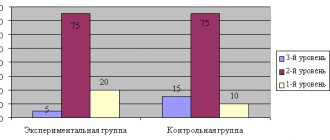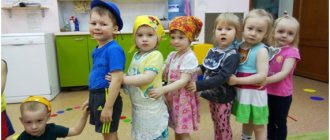Early age is the most crucial period of a person’s life. The main and most important acquisition of an early age is speech. Speech acquisition is a complex, multifaceted mental process, the formation of which occurs from the moment a child is born. So, what are the stages of speech development in young children?
Speech is one of the mental functions that distinguishes us from representatives of the animal world and is one of the main needs. In addition to this, speech is closely related to the formation of other skills in a child, especially at an early age, when the baby has a desire to learn something new. We present to your attention the research work of a 2021 graduate of the Professional Nanny course, “Speech development in young children.”
Introduction
Nowadays, the development of speech in children at an early age is one of the most important and main problems, since not all children develop speech according to established standards. This problem is considered most deeply by Gribova O.E. “What to do if your child does not speak / A book for those who are interested” [3] and Tkachenko T.A. “If a preschooler speaks poorly” [13].
Purpose of the work: to study the stages of development and methods of speech formation in young children.
Object of study: preschool children.
Subject of research: stages of speech development and methods of its formation.
Research methods:
- Research theoretical material on the topic of speech development in young children.
- Formation of a methodological piggy bank for speech development.
Theoretical foundations for studying speech development in young children
Stages of speech development at an early age
What should be done to ensure that the child’s speech develops correctly, in time for the baby to grow into a social being?
The development of speech in a child can be divided into several stages:
Period of infant cries (0 months - 2-3 months)
The baby's first cry occurs as a component of a defensive reaction caused by the cessation of placental blood circulation and the cooling of his body in the external atmosphere. A new complex synergy of voice formation is formed before our eyes as a side consequence of the innate synergies of thermoregulation and respiration. It is important that the vocal reaction during the first respiratory factor is not enough for voice formation.
Walking period (2-3 months - 5-6 months)
Observations have shown that the baby reacts to human speech already in the first week of life and stops it by the end of the second. As soon as the baby stops crying, he carefully monitors his mother - her behavior and conversation, imprinting in his memory the leisurely and smooth movements of his hands, head and eyes, the slow pace and volume of her speech.
By 2.5-3 months of life, communication between an adult and him becomes the child’s need, so he again and again uses a set of behavioral reactions that stimulates the adult to communicate emotionally with him.
In the third month of life, the child develops a new skill - he is able to look for an adult and hint at communication. The child fixes a long, concentrated gaze on him and smiles.
In the fourth month of a child’s life, the most significant acquisition is the development of communication between him and an adult using speech sounds.
During the fifth and sixth months, changes also occur in the child’s neuropsychic development. Various speech sounds and movements that are purposeful in nature are added to the child’s proactive appeals to an adult.
During the second half of the baby's life, a business style of communication appears, in which the main role is played by his playing with objects. This communication remains the main one until about 3-4 years of age.
In the period from 6-7 to 9-10 months, the child begins to understand the speech of an adult, which radically changes his usual behavior and affects the development of movements and speech.
At 8-9 months, the baby begins to imitate many sounds unfamiliar to him. The child reacts if he hears his name and can show one of the family members. His reaction to his name is reflexively connected with the sound of words, only in this way can the child learn to understand the meaning of the word.
Period of babbling pseudowords (9-10 months - 12-14 months)
By the end of the first year of life, the baby understands the meaning of more than 10 words and can pronounce at least 5 independently. He is much better at repeating syllables and even words after his parents.
At the tenth month, the child can associate a word he hears with an object familiar to him. Such associations promote speaking, and the baby already perceives simple commands.
Speech development of a child from 1 to 3 years of age.
For the development of understanding of speech at this age stage, it is characteristic that up to 1.5 years of age, connections between objects, actions and their verbal designations develop more intensively. However, the connection between them does not immediately become stable. It is possible that the child may not answer a task correctly understood correctly.
As a child ages, the need for communication arises - he wants to show, tell or ask something. If development occurs normally, then after the first year he develops active speech and the first words appear. True, they can only be understood by a child, depending on which sounds he is able to pronounce and which he cannot.
The period when the child begins to speak
At what age does a child begin to speak? In most cases, this happens by the age of two, even if he manages to utter his first words much earlier.
At the age of 3, the child’s perception of other people’s speech improves. But in some cases, the child hears new words pronounced incorrectly from his peers. Children begin to distinguish between words that are similar in sound and sometimes differ in one sound, focusing not only on a specific situation, but also on the sound design of the word. When learning a new word, a child strives to pronounce it correctly. Children begin to use more complex words with three or more syllables, although they may not always be able to pronounce all sounds correctly.
Speech development in younger preschoolers (4-5 years old)
At the age of 4-5 years, when the child already speaks well and talks with an adult on certain topics, it becomes possible to begin cognitive communication. The child acquires a sufficient vocabulary and begins to form grammatically correct phrases and pronounce sounds normally.
In the fourth year of life, children experience improvements in pronunciation, speech becomes more understandable and distinct. Simple common sentences predominate in children's speech.
In the fifth year of life, the child shows significant progress in mental and speech development. The baby is able to identify and name the characteristics and qualities of objects (for example, size and color), establish the simplest connections and accurately reflect them in speech. His speech becomes more varied, more precise and more meaningful. Resistance to attention and the ability to calmly listen to others to the end increases.
Development of speech in older preschoolers (6-7 years old)
A child of the sixth year of life improves coherent, monologue speech. It can convey the meaning of a fairy tale, poem or a specific situation. When composing a story, he concentrates his attention on the main details, and in most cases misses the secondary ones. In the sixth year, the child’s speech is still improving, phrases become more detailed and accurate, and pronunciation is clearer.
In the seventh year, the child’s speech becomes more and more precise, detailed, and consistent. During the retelling, the child talks not only about the main events, but also touches on everything that he himself read about. He is able to accurately describe a toy or picture, and answer questions posed by the parent after reading fairy tales.
Briefly about the main thing
- In order for a child to successfully master speech, you need to communicate with him as much as possible, even when he is not yet speaking. An adult is the main source and model of speech for a child.
- The child’s vocabulary is replenished during practical activities. Seeing and holding objects in his hands, using them for their intended purpose, the baby remembers the names and learns to use them correctly in his speech.
- The child’s speech will develop more actively if the parent offers age-appropriate books. At the same time, the plots should be close to reality and describe everyday activities familiar to the child: fairy tales are not recommended for children under 3 years of age.
- Overprotection in upbringing, incorrect pronunciation, high speed of speech, various mistakes and the use of too complex speech patterns by adults prevent a child from learning to speak.
- From 1 to 2 years of age, speech development goes like this: the child begins to separate words in the parent’s speech → observes the adult’s articulation and repeats words after him, gradually doing it better → meaningfully names the objects with which he interacted → recognizes and uses verbs to make statements desires → uses gestures less often and words more often → actively and unnoticed by others replenishes vocabulary → pronounces sentences of two and three words.
- At 2 years of age, the “speech explosion” begins. The child learns with great interest and easily assimilates new words and begins to think in words. Gradually, the words in the sentences become consistent.
- By the age of 3, the baby uses as many words as he understands. Learns to concentrate and listen, to perceive the plots of literary works and adult stories up to 4 sentences long. Assimilates the rules of behavior that the parent talks about.
The article was prepared based on materials from the course Sensitive periods of child development by V. N. Mogileva - candidate of psychological sciences and Montessori teacher AMI
Photo by Olga Goreva
Editor: Camila Klenowitz
The role of the family in the development of a child’s speech
Everyone knows that it is the family that helps a child develop himself as an individual and explore the vast world, but the modern pace of life does not always allow parents to pay enough attention to their children.
At an early age, an adult provides solutions to three main psychological tasks:
- developing the child’s ability to imitate speech and distinguish speech sounds, which is the basis for understanding the meaning of what is said;
- increasing active and passive vocabulary;
- formation of the ability to use speech in communication.
Statistics show that in families where close relationships are formed, children grow up active and independent. In those families where there is a lack of attention in the early years of the child, in adolescence he becomes withdrawn and aggressive.
A child’s speech is formed through the speech of his family members. And only in an environment of live communication, he not only listens to others, but also joins in the dialogue.
Parents are required to know how important the speech of adults is for the formation of a child’s speech and how exactly to conduct a conversation with him. Adults must speak correctly, without distorting words, pronouncing each sound clearly, take their time, pronouncing endings correctly. Faking adult speech to resemble child speech slows down its development, because distorted words reach the child. It is especially important to pronounce unfamiliar, new and long words especially clearly.
Parents who decide to conduct speech development classes at home need to do the following exercises:
- 2-3 games to develop fine motor skills,
- articulation gymnastics (preferably 2 times a day),
- 2-3 games to develop auditory attention or phonemic awareness,
- 2-3 games for the formation of lexical and grammatical categories.
Types of speech
Speech can be active or passive:
- Active - the one that the baby uses. The child knows the words he has learned, can confidently pronounce them, and construct sentences with their help.
- Passive is the one that the child understands, but for certain reasons does not pronounce. For example, he may know the word “TV”, but not say it because it is difficult for him.
It is very important to develop both active and passive speech of a child.
How to determine that a child has speech delay
Delayed speech development is a later acquisition of oral speech in comparison with conventional norms for children under 3 years of age. Delayed speech development can be characterized by qualitative and quantitative underdevelopment.
In order to correctly understand how to determine delayed speech development, it is necessary to know the stages and conditional norms of speech development in children at an early age.
Normally, at 1 year of age, a child’s active vocabulary contains approximately 10 words, and the passive vocabulary contains about 200 words. Up to a certain time, the passive vocabulary is much larger than the active vocabulary. Approximately 1.6 - 1.8 months. words from the passive vocabulary burst into the active vocabulary. In some children, the period of passive speech lasts up to 2 years, although in general speech development is normal.
Deviations in speech development within the normal range are allowed for 2-3 months in girls, and 4-5 months in boys. Only a speech therapist can correctly understand whether a child has a speech development delay or not.
Signs of delayed speech development at different stages of speech ontogenesis may be: lack of response to sound and speech, inactive attempts to repeat other people’s words, absence of one’s own speech at different stages of its development, absence of non-speech methods of communication.
Causes of delayed speech development
Why did the child have a delay in speech development? Causes may include disturbances during intrauterine development and the birth process, as well as adverse effects that the child encountered in the first years of his life.
The most severe disorders occur during 3-4 months of intrauterine development. At this time, the fetal nerve cells form brain structures. The causes of delayed speech development in children associated with the course of pregnancy and childbirth can be factors such as early and late toxicosis of pregnancy, extreme prematurity, birth trauma, intoxication with chemicals and drugs. Delayed speech development may be influenced by genetic factors.
Pathologies during pregnancy and childbirth are not always the causes of underdevelopment. Sometimes disorders are caused by factors affecting the health and upbringing of the child - these are reasons of a biological and social order.
Biological factor . Biological factors include complications after vaccination, a slow rate of maturation of the nervous system, as well as long-term diseases that weaken the child’s immunity at an early age. The biological basis of RRD is most often the presence of minimal brain dysfunction in the child caused by perinatal brain damage.
Hearing loss. It is very dangerous if a child has reduced hearing or cannot hear anything. When hearing loss occurs, a child’s speech cannot fully develop. In this case, even minimal deviations from the norm can be considered the cause of RRD. It is very important at what age the baby lost his hearing. If this happened at 5-6 years old, the child can retain speech skills. When a child is born deaf or has hearing loss in the first years of life, the chances of such a child speaking are zero.
Social factors. Such factors include frequent stress, lack of attention and communication in the family.
Prevention
If parents notice that their child’s speech development is lagging behind the norm, then they definitely need to contact the right specialist. Neurologists, speech therapists, defectologists, and corrective teachers are working on solving this problem. In special cases, the help of a facial surgeon or orthodontist may be needed.
In case of impaired understanding of speech, incomplete mobility of the lips, tongue, low level of fine motor skills, if hearing impairment is suspected, the following studies are carried out: hearing test, examination of speech understanding, examination of fine and gross motor skills, examination of articulation organs, examination of vocabulary, examination of phrasal speech.
Based on the results of the examination, the degree of mental retardation is determined and corrective work is planned. How is delayed speech development treated? Drug therapy, magnetic therapy, electroreflexotherapy, dolphin therapy and hippotherapy are carried out; A teacher and proofreader works with the child.
With uncomplicated forms of pathology and with fully completed correctional work, by the time the child starts school, the delay in the development of the child’s speech will be overcome. To do this, it is important that parents support all the requirements and recommendations of specialists.
Measures to prevent speech delay:
- creating conditions for a favorable course of pregnancy and childbirth, the first years of a child’s life;
- the formation of a speech environment rich in educational toys and various objects;
- ensuring normal social conditions for the life and development of the child;
- assessment of speech development by a speech therapist no later than 2-2.5 years.
In order to quickly compensate for delayed speech development, you need to promptly pay attention to the child’s communication problems. There are several degrees and varieties of RRD, which only a specialist can diagnose. He will also find out the possible cause of the development of a speech defect affecting the central nervous system and brain.
Parents' mistakes
Often it is the inattention of parents that leads to disturbances in the child’s speech. The main mistakes that are made in the family:
- Lack of help for the baby. Parents do not pay attention to communication.
- Adults “lisp”, distorting speech, giving the child the wrong role models.
The child remembers that his parents like his soft, childish pronunciation and is in no hurry to get rid of it, thus receiving love.
- Ignoring developmental delays.
- Reluctance to correct speech (including your own, for example, pronunciation defects, haste).
- Poor speech experience in a child. The baby is simply not taught to talk, and it is difficult for him to communicate, he does not know how to do this.
- Parents are tired and not ready to talk; it is easier for them to provide their child with a computer or phone with games.
- Adults read little to children.
Conclusion on Chapter I
From the very first days of life until the end of the preschool period, children have the most important task - the formation and development of speech. Each year of a child’s life is divided into stages and at each of them speech is improved - from the first infant cry to the composition of complex sentences.
During early childhood, children undergo intensive speech development. During this time, the child’s active vocabulary exceeds the passive one; the child learns that each object has its own name; after he hears the word, he tries to repeat it; he learns to compose simple and complex common sentences.
The development of a child’s speech is closely related to communication with adults, and a lack of this communication can lead to delayed speech development and also affect the development of the baby’s psyche. A child’s communication with the people around him allows him to increase his passive and active vocabulary, improve his pronunciation and the content of his speech.
Ways to develop speech in young children
Game activity as a means of speech development
Play is of great importance in the development of speech in young children. They love to play short outdoor games that help develop their speech. The more children enjoy the game, the more effective the result will be.
Play develops language, and language organizes play. The word is part of reality for the child. It is very important to properly organize the play environment, combining the interests of children and objects that will help in the development of speech.
Passive vocabulary is words the meaning of which a child understands, but does not speak due to age or due to delayed speech development. Children pronounce words and sounds as they hear them.
Games and exercises for developing passive vocabulary:
- "Errands." Choose a toy that is in front of the child and ask him to perform some action with it. For example, brush a doll’s hair, feed a teddy bear.
- "Do It". Ask your baby to clap his hands, jump, squat, spin, raise his arms up, close his eyes, open his mouth, etc.
Speech games aimed at developing vocabulary:
- "Balls and cubes." Offer to match items by color and place them in baskets. It is necessary to mark the color on the basket.
- "Big small". It is suggested to put large cubes and large balls in a large basket, and small ones in a small one.
- "Wonderful bag." Consider toys with your child: cubes, balls, be sure to pronounce their shape, and then hide them in a bag. Then the child must determine the shape of the object by touch and pull it out.
Speech development with the help of fiction
Fiction has a huge impact on the development and enrichment of a child’s speech.
A child’s first acquaintance with fiction begins with nursery rhymes and songs, then he listens to folk tales. A journey into the world of a fairy tale develops the imagination of children, and encourages them to write.
The book is considered as a means of developing children's speech and improving its content. She provides the child with mental and moral education.
Poetry
As you know, the easiest and most effective way to teach a child is through play. This is also true for situations where you need to practice the correct pronunciation of sounds. An interesting author’s technique for developing pronunciation and preparing a child for reading is described HERE: “Interesting games for 3-year-old children”
Speech therapy rhymes are a great way to practice if your child is unable to pronounce a particular sound. You can start learning these poems as early as 2–3 years old.
First word
What should a baby's first word be? Early development specialists believe that it does not necessarily have to be familiar and familiar to us. Experts tend to consider any recognizable set of sounds that denote a person, object or action (for example, “baka” instead of “dog”, “ka” instead of “porridge”) as a peculiar word.
Usually children say their first word at the age of 8-9 months. Most often these are onomatopoeias or words of two repeated syllables.
How to understand that a child said exactly a word, and not just a set of sounds? If the child’s statements are repeated under the same circumstances, even if you cannot understand them, rest assured that your baby said a word, his speech apparatus is simply not yet developed enough to pronounce this word legibly. To prevent your child’s speech development from slowing down, you should not speak to your baby in his “baby” language. If your child says “beep beep” while pointing at a car, say, “That’s right, it’s a car.” While walking in the yard, ask your child to show you the car. And to translate the word “car” from a child’s passive vocabulary to an active one, point to the car and ask: “What is that?” Then your baby will certainly learn a new word and learn to pronounce it correctly.
There is a myth that a child’s first word must be the word “mother.” Indeed, some children say “mom” as early as 4-5 months. Also, even before one year old, children can say “Lala”, “Baba”, etc. These are all easy-to-pronounce words that are formed from the repeated babble of a child. The words that are easy to pronounce come first.
Conclusion on chapter 2
The most effective method of developing the speech of a young child is his participation in various types of activities.
Productive activities (appliqué, modeling, drawing) form a child’s idea of the shape, color or properties of a particular object. During the lessons, the child develops imagination, fine motor skills and, most importantly, speech activity. The child discovers a lot of new things and wants to know about everything, this is how the child’s dialogue with an adult or teacher is formed.
Playful activities allow the child to improve not only the coordination of movements while playing with objects, but also the quality and quantity of words in his active vocabulary, as the child gives a name to the object/toy, comes up with a situation in which he is and explains his actions. Thus, we can say that play is a fruitful way to develop speech in children.
All the methods we propose contribute to the development and improvement of the child’s speech, and also help prevent its delay.






